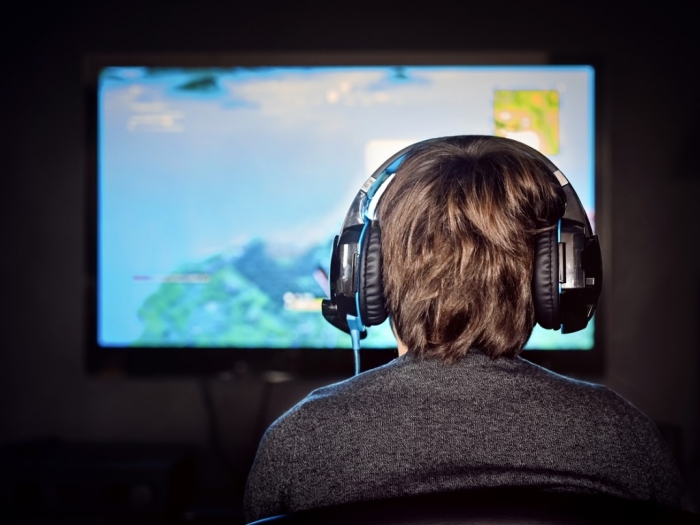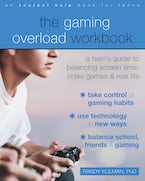By Randy Kulman, PhD, author of The Gaming Overload Workbook
Two words come to mind when managing your family during the coronavirus quarantine: safety and sanity. Obviously, the safety of our kids and families is the number one priority. Social distancing, sheltering in place, and washing your hands have become the mantras of moms and dads all over the world. While keeping household sanity may be a distant second in our priorities, nonetheless, this supports safety by keeping families more content, communicative, and collaborative.
Quarantining 24-7 is very difficult. Kids are stuck in their homes, don’t have an opportunity to engage in face-to-face relationships, and are restricted in their physical activities such as participation in team or individual sports. Many families live in urban areas, where COVID-19 is prevalent and home confinement is the norm. More fortunate are those who live in areas where they can venture outdoors more safely and have more breathing space, perhaps seeing friends from a distance and having more opportunities to exercise. Even in these cases, however, family sanity is difficult to achieve when you are living together morning, noon, and night; going to work and school in the same space; and contending with children who complain nonstop about being bored. Family sanity can be helped by engaging in an activity that is quiet, focused, and entertaining—screen time. That’s why I suggest loosening your normal rules around screen time during the quarantine.
But don’t change your parenting style so much that it neglects your family’s health. If you choose to allow more screen time during the quarantine, do it within the context of expecting and modeling a healthy and balanced “Play Diet.” For those of you who are unfamiliar with the LearningWorks for Kids construct of a Play Diet, it is a recipe of essential activities for children’s learning and psychological adjustment that recognizes the importance of a variety of play for child development. A healthy Play Diet consists of a balance of physical, social, creative, unstructured, and digital play, and is important for every child and adult. Healthy Play Diets vary based on individual needs, interests, age, and on situations such as whether it is a weekday or during the weekend, while on summer vacation, or over the week after Christmas, when parents are encouraged to modify expectations. The COVID-19 quarantine is one of those times for changing the rules for a healthy Play Diet.
The current pandemic has also changed the rules for parenting when it comes to screen time. Allowing more digital play/screen time is recommended for safety and sanity. Kids who are occupied in their homes and allowed to play more with their friends online will be less likely to run off to a friend’s house or pester their parents for things to do. In simple mathematical terms, there is more sustained leisure and housebound time for your kids than ever before. Proactive parenting that accounts for the excess free time can use Play Diets as a model for keeping the health and sanity of your home.
But how to achieve a healthy Play Diet during the quarantine? First, model healthy living for your kids. Make time to exercise; talk to friends and family; engage in a hobby; take care of yourself psychologically and spiritually; and use screens to work, relax, and communicate with others.
Next, create the expectation that everyone in the family will engage in daily physical, social, creative, unstructured, and digital play activities. Be explicit with your kids. Yes, you will allow them to have more screen time, but it’s not a free-for-all; you expect them to engage in healthy activities on a daily basis. It won’t be easy; you’ll have to devote time, thought, and money, but it will help everyone get through the quarantine healthier and happier.
A healthy Play Diet is typically defined by spending a lot of face-to-face time with friends and family, and engaging in social activities at home, at school, and in the community. It also involves regular physical fitness—for children and teens most often in the form of team sports, going to a gym, or participating in dance or yoga classes. During normal times, creative play often involves taking art or music classes, being involved in theater, playing in a band, or singing in a chorus or choir. Unstructured play is defined by hanging out with others with no particular goals, taking a walk outdoors, or running around the neighborhood. All these play activities are more difficult during the quarantine, but not impossible with some planning and effort.
I will expand on detailed strategies for achieving a healthy Play Diet during the quarantine in future posts on www.learningworksforkids.com, but here are a few basic steps that will keep screen time in check and get you started:
Physical Play – Take a family walk every day, no excuses. This is best done at a regularly scheduled time.
Social Play – Videoconference with a family member or family friends each night before dinner.
Creative Play – Do something new every day. Your kids have more time on their hands, so have them try something new. Try a new recipe, read a book by a new author, take apart a Lego construction and make something different, do a craft project with items found around the house, or learn about something of interest through an Internet search.
Unstructured Play – Take a few minutes each day to relax, stretch, daydream, make a plan for the future, and appreciate nature and the spring season.
Digital Play – This is where your kids will tell you what they want to do. Allow age-appropriate gameplay and think about playing with them.
Randy Kulman, PhD, is a clinical child psychologist who has worked with kids and families for the past thirty years, and has become a leading expert on the use of digital technologies for improving thinking skills in children. He is founder and president of the technology website, LearningWorks for Kids, an online platform for informing and instructing parents on how to enrich and enhance their kids’ digital playtime. His blog, Screen Play, on www.psychologytoday.com helps kids and parents balance their screen time with other activities. He is author of Train Your Brain for Success and Playing Smarter in a Digital World. Learn more at www.learningworksforkids.com.



 2024 Peace Playbook: 3 Tactics to Avoid Clashes with Your Partner
2024 Peace Playbook: 3 Tactics to Avoid Clashes with Your Partner